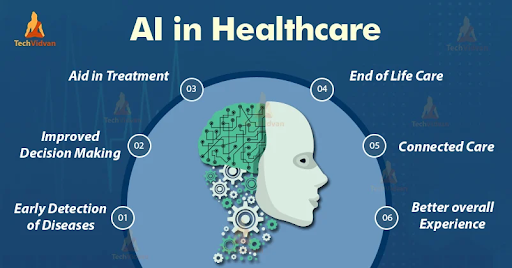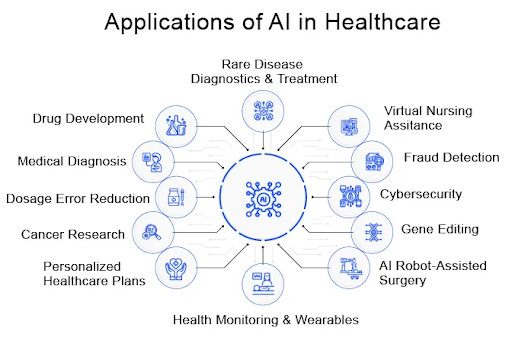AI in Healthcare: Transforming the Way We Deliver Care
Artificial intelligence (AI) is transforming healthcare in many ways, from improving diagnosis and treatment to automating tasks and improving patient communication. Here are some of the most exciting AI applications in healthcare today:
AI-powered diagnostic tools can analyze medical images and data to identify diseases and conditions more accurately and efficiently. For example, AI algorithms can be used to detect cancer cells in mammograms or identify early signs of Alzheimer’s disease in brain scans.

AI-powered treatment planning can help doctors recommend personalized treatments based on patients’ individual needs. For example, AI algorithms can be used to predict a patient’s response to different cancer treatments or identify the best combination of drugs for a patient with multiple conditions.
AI-powered automation can automate administrative tasks, such as scheduling appointments and processing claims, freeing up doctors and nurses to focus on patient care. AI can also be used to improve patient communication, such as by providing chatbots that can answer patients’ questions or by translating medical information into different languages.
AI-powered research can help researchers discover new insights and develop new treatments by analyzing large datasets of medical data. For example, AI algorithms can be used to identify new drug targets, predict the side effects of new drugs, or develop personalized vaccination schedules.
AI-powered prevention can help prevent diseases by identifying risk factors and providing early interventions. For example, AI algorithms can be used to analyze data from wearable devices to identify people at risk of heart disease or stroke.

AI in healthcare
Conclusion
AI is still in its early stages of development in healthcare, but it has the potential to revolutionize the way we deliver care. By automating tasks, providing insights, and
Personalizing treatment, AI can help us improve the quality and accessibility of healthcare for everyone.
Here are some additional AI applications in healthcare:
- Virtual assistants: AI-powered virtual assistants can help patients with tasks such as scheduling appointments, refilling prescriptions, and finding health information online.
- Wearable devices: AI-powered wearable devices can track patients’ health data, such as heart rate, blood pressure, and sleep patterns. This data can be used to monitor patients’ health, detect early signs of disease, and provide personalized recommendations.
- Telemedicine: AI can be used to improve telemedicine services by providing real-time translation, diagnostic assistance, and remote patient monitoring.
- Mental health: AI is being used to develop new tools for diagnosing and treating mental health conditions. For example, AI-powered chatbots can be used to provide cognitive-behavioral therapy (CBT) to patients with depression or anxiety.
AI is a powerful tool that has the potential to transform healthcare for the better. As AI continues to develop and mature, we can expect to see even more innovative and impactful applications of AI in healthcare in the years to come.

Artificial intelligence (AI) is transforming healthcare in many ways, from improving diagnosis and treatment to automating tasks and improving patient communication. Here are some of the most exciting AI applications in healthcare today:
AI-powered diagnostic tools can analyze medical images and data to identify diseases and conditions more accurately and efficiently. For example, AI algorithms can be used to detect cancer cells in mammograms or identify early signs of Alzheimer’s disease in brain scans.

AI-powered treatment planning can help doctors recommend personalized treatments based on patients’ individual needs. For example, AI algorithms can be used to predict a patient’s response to different cancer treatments or identify the best combination of drugs for a patient with multiple conditions.
AI-powered automation can automate administrative tasks, such as scheduling appointments and processing claims, freeing up doctors and nurses to focus on patient care. AI can also be used to improve patient communication, such as by providing chatbots that can answer patients’ questions or by translating medical information into different languages.
AI-powered research can help researchers discover new insights and develop new treatments by analyzing large datasets of medical data. For example, AI algorithms can be used to identify new drug targets, predict the side effects of new drugs, or develop personalized vaccination schedules.
AI-powered prevention can help prevent diseases by identifying risk factors and providing early interventions. For example, AI algorithms can be used to analyze data from wearable devices to identify people at risk of heart disease or stroke.

AI in healthcare
Conclusion
AI is still in its early stages of development in healthcare, but it has the potential to revolutionize the way we deliver care. By automating tasks, providing insights, and
Personalizing treatment, AI can help us improve the quality and accessibility of healthcare for everyone.
Here are some additional AI applications in healthcare:
- Virtual assistants: AI-powered virtual assistants can help patients with tasks such as scheduling appointments, refilling prescriptions, and finding health information online.
- Wearable devices: AI-powered wearable devices can track patients’ health data, such as heart rate, blood pressure, and sleep patterns. This data can be used to monitor patients’ health, detect early signs of disease, and provide personalized recommendations.
- Telemedicine: AI can be used to improve telemedicine services by providing real-time translation, diagnostic assistance, and remote patient monitoring.
- Mental health: AI is being used to develop new tools for diagnosing and treating mental health conditions. For example, AI-powered chatbots can be used to provide cognitive-behavioral therapy (CBT) to patients with depression or anxiety.
AI is a powerful tool that has the potential to transform healthcare for the better. As AI continues to develop and mature, we can expect to see even more innovative and impactful applications of AI in healthcare in the years to come.
